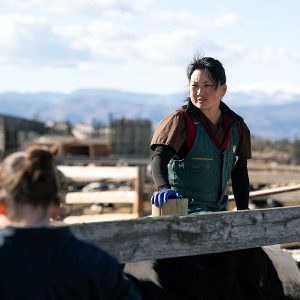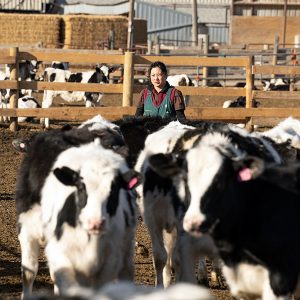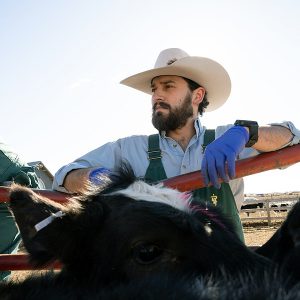State of Colorado Veterinary Loan Forgiveness Program Selects Six Recipients
By Christopher Outcalt, Colorado State University Veterinary Teaching Hospital:
A state of Colorado program that helps pay off student loan debt for veterinarians who practice in underserved areas has announced six recipients for 2024.
The Veterinary Education Loan Repayment Program (VELRP), was signed into law in 2017. At that time, it provided up to $70,000 to pay off student loan debt for veterinarians who agreed to serve in a rural part of the state where vets are in need for up to four years. Last year, the Legislature expanded the program to accommodate $90,000 of student debt relief for up to six veterinarians.
This year’s recipients — Dr. Natalya O’Regan, Dr. Clay Carlson, Dr. Erica Shannon, Dr. Courtney Mael, Dr. Tiffany McGregor and Dr. Austin Traphagan are practicing large-animal medicine in rural communities across the state’s eastern plains and on the Western Slope.
“Being selected to be a part of this program allows me to focus more on the veterinary tasks needed in my practice area, while relieving the financial stress from educational debt,” Carlson said. “The VELRP is not only for me, but for all the clients that I serve. My clients are gaining a veterinarian that is devoted to serving rural areas of northeastern Colorado that are in so much need.”
Now, instead of paying off loans, Carlson said he will be able to put more money toward equipment and supplies to maintain his mobile practice around Sterling.
Continuing to serve
 The bill to expand the VELRP was sponsored last year by Sen. Joann Ginal, Sen. Rod Pelton, Rep. Karen McCormick and Rep. Ty Winter. Preference is given to applicants who graduated from the Colorado State University College of Veterinary Medicine and Biomedical Sciences.
The bill to expand the VELRP was sponsored last year by Sen. Joann Ginal, Sen. Rod Pelton, Rep. Karen McCormick and Rep. Ty Winter. Preference is given to applicants who graduated from the Colorado State University College of Veterinary Medicine and Biomedical Sciences.
McGregor, who lives in Fort Morgan, said she’s excited to be able to focus more directly on aiding an area that she happily calls home. “It is amazing to realize my loans will be paid off by the time I’m 40,” she said. “Even better, I can continue to serve the same area I have already come to know and love.”
Based south of Grand Junction in Delta, O’Regan was honored to be selected. “With this support I will be able to help address the shortage of veterinarians in rural areas,” she said.
Program and council information
The average salary for veterinarians who choose to practice in rural areas is significantly less than Colorado’s statewide average. What’s more, veterinary medicine graduates who go on to practice as large-animal vets in rural areas, a critical need in many communities, are often carrying educational debt that amounts to more than three times their salary.
“Our rural veterinarians truly serve through a sense of passion and responsibility — and yet the value they offer in protecting the biosecurity of our food resources and to the state’s agricultural economy are immeasurable,” said Jon Stocking, senior director of operations for the College of Veterinary Medicine and Biomedical Sciences, who helps coordinate VELRP. “This program is one small way the state recognizes and supports that value.”
The program is overseen by the VELRP Council, which selects the participants, is appointed by the governor, and is supported by CSU administrative staff. The current council members are:
- Chair: Scott Johnson, Flying Diamond Ranch
- Vice-chair: Dr. Kayla Henderson, Colorado Veterinary Medical Association
- Dr. Melinda Frye, associate dean of the DVM Program at the CSU College of Veterinary Medicine and Biomedical Sciences
- Dr. Morgan McCarty, representative of the State Commissioner of Agriculture
- Dr. John Raftopoulos, Colorado Livestock Industry
 The debt payoffs are phased under the following terms:
The debt payoffs are phased under the following terms:
- Upon completion of six months of the first year of service under the program, up to $15,000
- Upon completion of a second year of service under the program, up to an additional $20,000
- Upon completion of a third year of service under the program, up to an additional
$25,000 - Upon completion of a fourth year of service under the program, up to an additional $30,000











